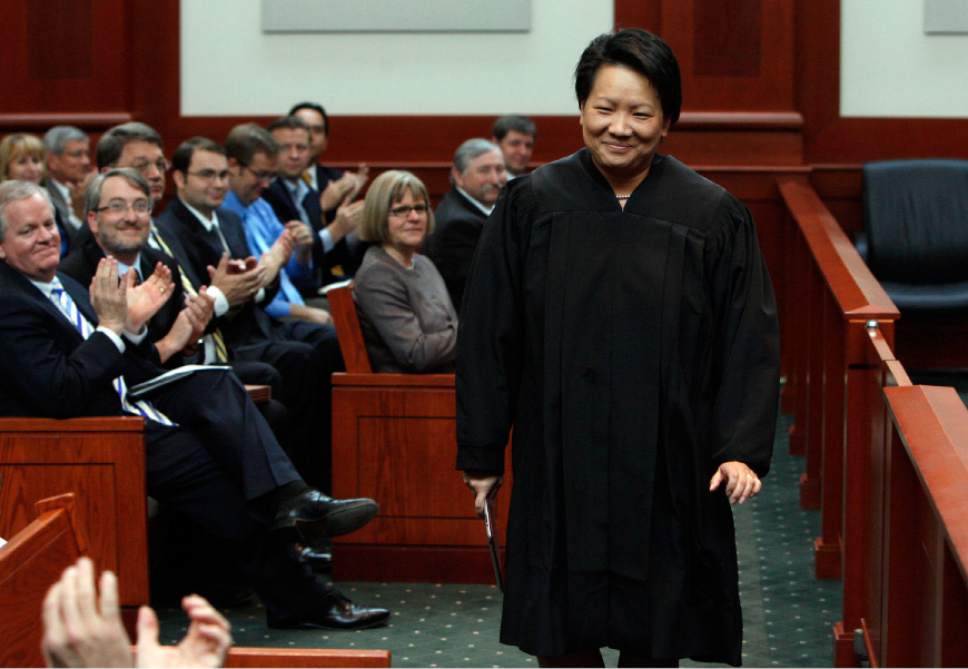This is an archived article that was published on sltrib.com in 2016, and information in the article may be outdated. It is provided only for personal research purposes and may not be reprinted.
The Utah Judicial Performance Evaluation Commission has turned thumbs down on just one of nearly 90 judges on the ballot for retention this year.
On a 7-2 vote, the commission recommended against Su Chon's retention, saying the 3rd District judge does not meet the minimum standard for legal ability and scores well below the average of her peers in other categories.
Appointed to the bench in 2012, Chon she "respectfully disagrees" with the commission's opinion and is asking voters to allow her to stay.
A Korean immigrant who came to the United States as a child, Chon said her grandfathers were tortured and mistreated during the war there because the government refused to uphold the law.
"That family story has impacted my life significantly and that's why I decided to become a lawyer," she said. "It means so much to me to be able to uphold the law in the state of Utah."
Chon said she works hard to ensure people get a fair chance in her court and noted that each of her five rulings appealed to higher courts have been upheld.
Charlotte L. Miller, an attorney and former president of the Utah State Bar, said Chon is an excellent judge. She said when there is a controversy that goes to court, one sides loses and that can influence survey results.
"Su is a very smart, hardworking, thoughtful, intelligent judge," Miller said. "I know many lawyers who also think that."
Chon was appointed to the bench by Gov. Gary Herbert four years ago, despite the Senate Judicial Confirmation Committee's 4-2 vote against her confirmation. Some committee members noted she had never taken a case to trial and said they were concerned about her lack of courtroom experience.
But supporters praised Chon, then attorney for the state's Office of the Property Rights Ombudsman, as a hard worker with a good legal mind. The full Senate ultimately voted 17 to 10 to confirm her.
"I want to assure you I will apply the same dedication and hard work that I've applied to every job I've had," Chon said after the vote. "And I will make you proud in several years."
After serving three years on the bench, judges are subject to periodic retention votes during general elections. Judicial retention recommendations are provided to assist voters in reaching a decision, said Jennifer Yim, the commission's executive director.
"We want you to make up your own mind," she said.
To reach a recommendation, the 13-member Utah Judicial Performance Evaluation Commission conducts surveys and gathers observations from attorneys, court staff, jurors and members of the public.
The data is used to score judges on a scale of one to five — one being inadequate and five, outstanding — for legal ability, integrity, temperament and administrative skills. In addition, judges are given a pass or fail on procedural fairness.
In general, a judge must earn a minimum of 3.6 score in each category and receive a "pass" for the commission to recommend retention, although it can vote to counter the results.
In Chon's case, 94 people responded to a survey, with 63 percent recommending that she be retained.
She scored 3.4 in legal ability, 3.8 for her administrative skills and communication and 3.9 for overall procedural fairness. The scores were lower than the average of 4.2 or higher score of all other judges.
"Survey respondents focus on her perceived weaknesses in following legal precedent, lack of meaningful legal analysis in written decisions and slow decision-making," the commission said in its report on Chon. "Some respondents view Judge Chon as a hard worker, noting she has improved over time. Others find her indecisive and unsure of her legal rulings, particularly in civil cases."
Courtroom observers were more favorable, commending Chon for "attentive listening skills" and the equal treatment of those appearing before her. But there also were mixed reviews.
"Some see her as a no-nonsense professional who runs an efficient courtroom, while others perceive her as emotionally detached and somewhat intimidating," the report said.
Chon graduated from Brigham Young University with an undergraduate degree in 1991 and a law degree in 1994, according to her biography on the state courts website. In addition to serving as property rights ombudsman, she has worked in small- and medium-sized law firms.
According to her biography, Chon received the Utah State Bar's Pro Bono Lawyer of the Year Award in 2005 and the Raymond S. Uno Award for the Advancement of Minorities in the Legal Profession in 2008.
Twitter: @PamelaMansonSLC —
Want more information?
O Utah Judicial Performance Evaluation Commission recommendations on judge retentions and supporting documentation are compiled at http://judges.utah.gov. Voters also can get a paper voter information pamphlet mailed to them by calling the lieutenant governor's office at 801-538-1041.



